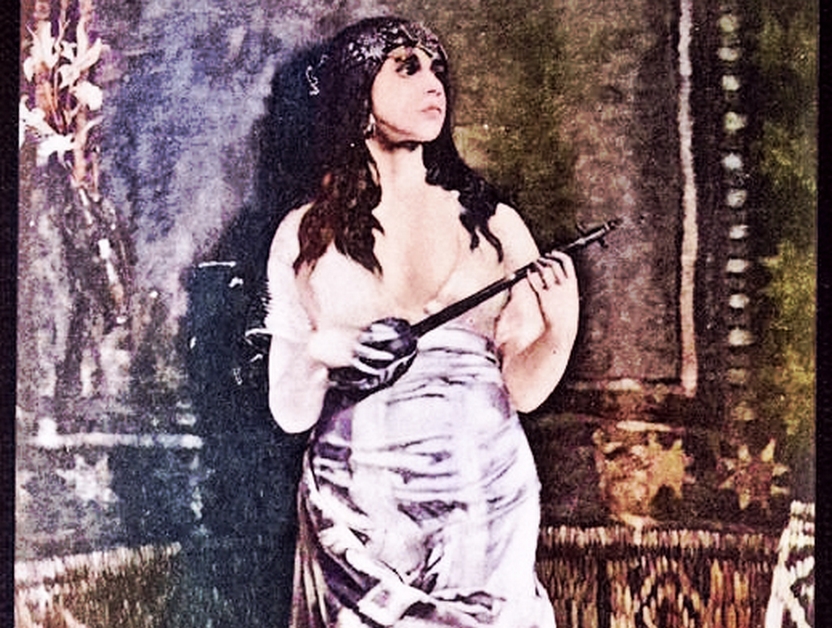Albert Ehrenstein (1886-1950) was an Austrian Jewish Expressionist writer and poet. He was born in Vienna, later lived in Zurich and Berlin until the early 1930s and from Switzerland moved to New York where he spent the rest of his life. When he was in his late twenties, Ehrenstein and his friend Oskar Kokoschka traveled in the Middle East. Between 1932 and 1941 he lived mostly in Italian Switzerland and thus was able to escape the Nazis who by 1933 were burning his books. In the United States he was unsuccessful in finding an audience or even to manage the English language. The last decade of his life was spent in poverty, depending on support from his friends who in the end also financed his burial.
Albert Ehrenstein Archive
Enlarge text Shrink text
| Title |
Albert Ehrenstein Archive. |
|---|---|
| Additional Titles |
כותרת בעברית: ארכיון אלברט ארנשטין. Archive of Albert Ehrenstein. |
| Citation Note |
ARC. Ms. Var. 306, Albert Ehrenstein Archive, Archives Dept, National Library of Israel, Jerusalem |
| Host Item |
Albert Ehrenstein Archive. |
| Former Call Number |
Ms. Var. 306 |
| Level of Description |
Fonds Record |
| Biographical summary |
Albert Ehrenstein was born as son of Hungarian Jews in Vienna-Ottakring in 1886. He attended high school and then began to study history and philosophy at the university of Vienna. In 1910 he received his PhD, but had already decided to do literary work. His first poem, Wanderers Lied, was published in 1910 by Karl Kraus in the magazine Die Fackel. In 1911 Ehrensteins story Tubutsch was published with illustrations by Oskar Kokoschka. Through Kokoschka he met Herwarth Walden and Franz Pfemfert, and became one of the most important Expressionist authors. He also corresponded with Else Lasker-Schüler, Gottfried Benn and Franz Werfel. At the beginning of WWI Ehrenstein was assigned to work in the Vienna war archives. From the beginning he was opposed to war and expressed this in a series of articles and poetry. He joined the Dadaist magazine Die Neue Jugend which was soon banned. Ehrenstein also worked at the Kurt Wolff publishing house until he left for Zurich in 1918. After the end of the war he supported the revolution in Germany, and signed the manifest of the antinationalist Socialist party. During the war he had met the actress Elisabeth Bergner, fell in love and dedicated a number of poems to her. In the 1920s he traveled around Europe, Africa, the Middle East and China, where he stayed for a while and studied Chinese literature and composed several adaptations from the Chinese. 1928 he moved to Switzerland, and lived from 1932 in Brissago. He was blacklisted by Nazi students in 1933, during the book burning on May 10, 1933 also his books were burned. In 1934 he traveled to the Soviet Union, in 1935 he attended the congress for the defense of culture in Paris. Since he didn't have a work permit for Switzerland he received a fine in 1936, and an expulsion order in 1938. This was revoked on the request of Hermann Hesse. To prevent a further expulsion he became a Czech national, and lived without any financial stability in Zurich from 1939 until 1941. Then he joined his brother Carl in England, moved to France and finally escaped on an emergency visa from Spain to the United States. Thanks to the support of Thomas Mann, Richard Hülsenbeck, George Grosz and others he received his residence permit, but he was not able to work or receive a sustainable income. 1949 he returned to Europe, but didn't find a publisher and went back disappointed to New York. He died there in an institution for the poor on Welfare Island in 1950. |
| Ownership history |
Already in 1939, Albert Ehrenstein contacted the director of the JNUL, Gotthold Weil, concerning the possible transfer of his papers to Palestine. However this project did not come to an end then. Eventually, Eugen Höflich (Moshe Yaakov Ben-Gavriel) permanently deposited the archive in the National Library in 1957. |
| Language Note |
The material is in German. |
| Credits |
Albert Ehrenstein Archive, The National Library of Israel. Digitization and cataloguing of this fonds was funded by Deutsche Forschungsgemeinschaft (DFG / German Research Foundation) under Germany's Excellence Strategy - EXC 2176 'Understanding Written Artefacts: Material, Interaction and Transmission in Manuscript Cultures', project no. 390893796. The research is conducted within the scope of the Centre for the Study of Manuscript Cultures (CSMC) at Universität Hamburg. |
| National Library system number |
990026190700205171 |
| Links |
תמונת ארכיון |
When using this material, please acknowledge the source of the material as follows:
Albert Ehrenstein Archive, The National Library of Israel. Digitization and cataloguing of this fonds was funded by Deutsche Forschungsgemeinschaft (DFG / German Research Foundation) under Germany's Excellence Strategy - EXC 2176 'Understanding Written Artefacts: Material, Interaction and Transmission in Manuscript Cultures', project no. 390893796. The research is conducted within the scope of the Centre for the Study of Manuscript Cultures (CSMC) at Universität Hamburg.
תנאי השימוש:
Appropriate Conditions of Use Have Been Established for Every Archive File
The terms of use appear on the archival file page on the National Library website.
For more information about the copyright status inquiry service and terms of use for items from the Library’s collections, click here.
MARC RECORDS
Have more information? Found a mistake?

 Sign in with Google
Sign in with Google
 Sign in with Facebook
Sign in with Facebook





